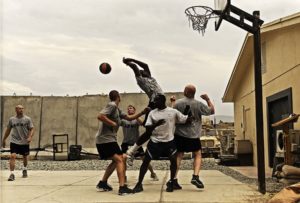Retired attorney Buddy Perkel remembers where he first learned to negotiate — on the basketball courts of New York City in the 1930s.
“Pickup basketball taught me how to give up,” said Perkel, who turns 91 this month. The Provincetown resident grew up across the street from basketball, tennis, and handball courts, and adult referees were not around. When a disagreement occurred, it was up to the kids to resolve it. Sometimes, players wouldn’t admit to being wrong.

“Finally, someone on one team says, ‘Come on, give it up, let’s play,’ ” Perkel said. “That’s a life lesson. Sometimes, you just give up, even when it doesn’t feel right, because you move your community forward.”
Turns out that pickup players in more recent days have learned some of the same lessons.
Min Tang graduated from Nauset High in 2011 and played basketball for the Warriors during his years there. Since then, he’s continued to play pickup ball locally. He said the biggest lesson he learned on the court is picking his battles.
“If you disagree with someone but you know they aren’t going to be open-minded, then why bother?” Tang said. “I know plenty of people who are always arguing with someone about something. They’re also the last people I’d expect to stop and think about whether they are correct. You can’t change everyone’s mind, so make sure it’s worth it before starting a disagreement. Play ball.”
Tang agreed that the lessons he learned on the court have factored into his adult life. “The people who manipulate the rules in something as meaningless as a pickup game will be the same people who manipulate other things in life to get what they want,” he said.
There’s been a lot of discussion about cheating and fairness this year, a time of political divisiveness and the demands of a pandemic. In athletics, sportsmanship varies from one sport or one athlete to another.
This fall, four Nauset athletes received individual sportsmanship awards from the Cape & Islands League. Nauset boys cross country won the team award for sportsmanship in the league as well.
Nauset cross country coach Moira Nobili said she tries to emphasize good sportsmanship each season, but “particularly this year, the kids were aware of other people.”
Runners Quinn MacDonald and Matt Dadoly received individual sportsmanship awards for the team.
“What I admired most about them is that they guided the younger kids and instilled confidence in them,” Nobili said. In practice, the two runners often “stayed back for kids to help them finish.”
Nobili said distance runners are usually shy by nature, and attempts to cheat don’t happen very much in high school cross country.
“I don’t think I’ve ever actually seen anyone blatantly try and cheat while playing, and I have played against many ‘dirty’ players,” Artie O’Neil said. O’Neil is a senior at Nauset High who was awarded an individual sportsmanship award for the boys soccer team this season.
He said he has seen some players try to express their anger during a game by making a cheap slide tackle at an opposing team’s player.
“At the end of the day, we’re all playing because we love the game, and although I can get very competitive, it’s always important to remember we are all playing for the same reason,” O’Neil said. “Treating each other with respect should be a top priority.”
Golf can be an elitist game. Some golf courses or clubs are private and will allow only a certain level of player to participate; other courses are public but require a certain dress code.
Former Eastham resident Nick Taber grew up playing golf and has played in tournaments on the Cape. In a casual game among friends, dropping a ball in a better spot or taking a mulligan here and there isn’t that big a deal. But in competitive golf, it’s unacceptable.
“If I’m in a competitive game, and it’s coming down to the wire, then I’m definitely keeping an eye out for that sort of thing,” Taber said. “A kick or a free drop could be the difference between winning and losing a hole.” Golf has to be played, he added, “with the utmost integrity.”
“Everyone knows one or two people who blatantly try to manipulate the rules so they can win,” Tang said. But part of the challenge of sportsmanship is in deciding when to “give it up,” as Perkel put it, for the sake of the game, and when to take a stand.
“They are everywhere, and there’s no way to avoid them,” said Tang of those who don’t play fair. “I usually won’t speak up unless it’s something I strongly disagree with and it’s affecting the quality of the game.”
